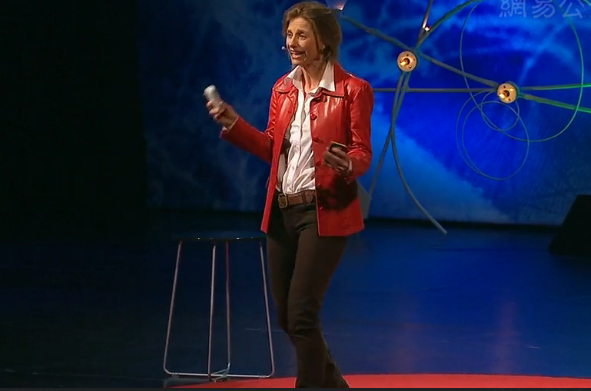(单词翻译:单击)
演讲文本
Three years ago, I was standing about a hundred yards from Chernobyl nuclear reactor number four.
三年前,我站在距离切尔诺贝利第四号核子反应炉大约一百码外。
My Geiger counter dosimeter, which measures radiation, was going berserk,
我的盖革放射量测定器,用来测量辐射量,指数狂飙,
and the closer I got, the more frenetic it became, and frantic. My God.
当我越接近,机器的反应越激烈,我的天。
I was there covering the 25th anniversary of the world's worst nuclear accident,
我当时在那里播报世上最严重的核灾事故25周年报导,
as you can see by the look on my face, reluctantly so, but with good reason,
你可以看到我脸上的表情,不太情愿,但是我有个好理由,
because the nuclear fire that burned for 11 days back in 1986
因为1986年时核火灾延烧了11天,
released 400 times as much radiation as the bomb dropped on Hiroshima,
释放的辐射量大约是投掷在广岛的原子弹的400倍,
and the sarcophagus, which is the covering over reactor number four,
而用来覆盖第四号反应炉的“石棺”
which was hastily built 27 years ago, now sits cracked and rusted and leaking radiation.
在27年前匆促完成,现在已破裂、生锈,并且释出辐射。

So I was filming.
当时我在拍摄,
I just wanted to get the job done and get out of there fast.
只想把工作完成,赶快离开现场。
But then, I looked into the distance, and I saw some smoke coming from a farmhouse,
在那当下,我望向远方,看到农舍上冉冉升起的炊烟。
and I'm thinking, who could be living here?
我想,谁会住在这里?
I mean, after all, Chernobyl's soil, water and air,
我的意思是毕竟切尔诺贝利的泥土、水和空气
are among the most highly contaminated on Earth,
是世界上受到最严重污染的地方之一,
and the reactor sits at the the center of a tightly regulated exclusion zone, or dead zone,
而反应炉座落在严密管制禁区的中央,或者说是死亡禁区,
and it's a nuclear police state, complete with border guards.
那是一个核能警察国家,有边防警察。
You have to have dosimeter at all times, clicking away,
你得时时刻刻带着放射量测定器,
you have to have a government minder,
你得要有政府官员陪同,
and there's draconian radiation rules and constant contamination monitoring.
而且还有很严格的辐射法规,以及不间断的污染监测。
The point being, no human being should be living anywhere near the dead zone.
重点是,没有人可以住在靠近死亡禁区的任何一个角落。
But they are.
但是他们却住在那里。
It turns out an unlikely community of some 200 people are living inside the zone.
结果是一群不太像社区的200人住在里面,
They're called self-settlers.
他们被称为自主移居者。
And almost all of them are women,
他们几乎全都是女性,
the men having shorter lifespans in part due to overuse of alcohol, cigarettes, if not radiation.
男性的寿命较短,有一部分是因为他们饮酒过量、抽烟,如果排除辐射因素的话。
Hundreds of thousands of people were evacuated at the time of the accident,
在意外发生时有成千上万人被撤离,
but not everybody accepted that fate.
但不是每个人都接受这样的命运安排。
The women in the zone, now in their 70s and 80s, are the last survivors of a group who defied authorities
住在禁区的女性现在大概7、80岁,是最后一批违反公权力的幸存者,
and, it would seem, common sense, and returned to their ancestral homes inside the zone.
对他们来说这就像常识,回到他们在禁区里的故乡。
They did so illegally.
这么做其实是违法的。
As one woman put it to a soldier who was trying to evacuate her for a second time,
其中一名女性向第二次要驱离她的士兵表明:
"Shoot me and dig the grave. Otherwise, I'm going home."
“一枪毙了我,然后帮我挖个坟。否则我要回家了。”
Now why would they return to such deadly soil?
那么为什么他们要,回到如此致命的土地上呢?
I mean, were they unaware of the risks or crazy enough to ignore them, or both?
我的意思是,他们有意识到这些风险吗?或是他们疯狂到可以忽略这个事实?还是说两者都是?
The thing is, they see their lives and the risks they run decidedly differently.
重点是,他们肯定用很不同的方式看待自己的生命和要冒的险。
视频及简介
演讲简介:
Chernobyl是世上最可怕的核意外的地點;最近27來,這區域被称为禁区。然而,有一个200人的社区住在那,差不多全部都是年长女人。这些自豪的祖母违反了搬迁的命令;因为他们对家的联系,还有对社区的感情,一种比辐射更强的力量。


